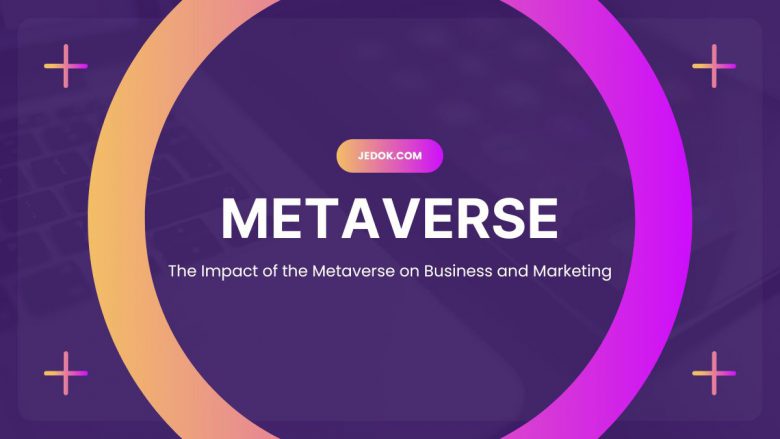
The concept of the metaverse has been around for several years, but with recent advancements in technology, it has become a hot topic in the business and marketing world. The metaverse is essentially a virtual world that is accessed through immersive technologies like virtual reality (VR) and augmented reality (AR). In this blog post, we will explore the impact of the metaverse on business and marketing.
1. New Opportunities for Brand Engagement
The metaverse is a virtual world where users can create their own avatars and interact with other people in real time. It is a new frontier for businesses to explore as it presents exciting opportunities for brand engagement. The metaverse offers an immersive experience that goes beyond traditional marketing strategies, allowing brands to connect with consumers on a more personal level.
One of the most significant benefits of the metaverse is its potential for storytelling. Brands can create unique narratives and experiences within the virtual world that are tailored to their target audience. This approach allows companies to build emotional connections with consumers, which in turn drives loyalty and advocacy. Additionally, the metaverse offers endless possibilities for interactive content such as games, quizzes, and challenges that engage users in fun and exciting ways.
The rise of the metaverse also means breaking down geographical barriers when it comes to engagement opportunities.
2. Increased Focus on User Experience
The metaverse is an ever-evolving digital world that has captured the attention of brands and marketers. With its potential to reach a vast audience and offer immersive experiences, businesses are increasingly turning their attention towards creating engaging user experiences in this virtual landscape. The focus on user experience in the metaverse is paramount, as it can make or break a brand’s efforts to connect with consumers.
Creating interactive experiences that allow users to engage with your brand in unique ways will be crucial for success in the metaverse. Brands will need to leverage cutting-edge technologies such as augmented reality, virtual reality, and 3D modeling to create immersive environments that stand out from the crowd. Additionally, incorporating gamification elements into these experiences can help drive engagement and keep users coming back for more.
In short, businesses must prioritize the user experience in their metaverse strategies if they hope to succeed in this brave new world of digital marketing.
3. Emergence of New Advertising Formats
The emergence of the metaverse has opened up new frontiers for businesses to reach and engage with their target audience. As this virtual world grows in popularity, advertising formats will continue to evolve and become more immersive. One example of these new advertising formats is virtual billboards, which allow advertisers to display their messages in a 3D environment that can be seen by millions of users.
Sponsored virtual experiences are another exciting development in the metaverse. Brands can create unique, interactive experiences that put them at the center of attention for users. For instance, a fashion brand could sponsor a virtual runway show where users can attend and see models wearing their latest collection. Or a sports brand could sponsor a virtual tournament where gamers compete against each other while wearing branded gear.
As more people spend time in the metaverse, businesses will have to adapt their marketing strategies accordingly.
4. Impact on Physical Retail Spaces
The metaverse is quickly becoming a buzzword in the world of business and marketing. It represents a virtual space where people can interact with each other and digital objects in real time. While it may seem like science fiction, the metaverse is already starting to have an impact on physical retail spaces. As more consumers shift towards online shopping, retailers are looking for new ways to engage with their customers.
One potential use case for the metaverse in retail is virtual showrooms. Retailers could create immersive experiences that allow customers to browse products in detail and make purchases without ever leaving their homes. This would not only reduce overhead costs associated with maintaining physical storefronts but also provide a unique customer experience that cannot be replicated in traditional brick-and-mortar stores.
Another way the metaverse could impact physical retail spaces is through augmented reality (AR) technology.
5. Need for New Skillsets
The metaverse is quickly becoming the next big thing in business and marketing. This virtual world, where people can interact with each other and digital content seamlessly, presents unique opportunities for companies to engage with their customers like never before. However, to fully take advantage of this new platform, businesses need to develop a whole new set of skills.
One key skill set needed for the metaverse is an understanding of virtual reality technology. To create compelling experiences within the metaverse, companies will need skilled developers who can design immersive environments that users will find engaging. Additionally, marketers will need to be able to work within this environment and understand how it differs from traditional online advertising methods.
Another important skill set needed for success in the metaverse is community building. Companies will need experts who can foster online communities around their brand or product within the virtual world.
Conclusion
The metaverse presents a wealth of opportunities for businesses to engage with consumers in new and exciting ways. However, it also requires a significant shift in mindset and skillset. Brands that are able to adapt to this new environment will be well-positioned to succeed in the future of marketing and business.


